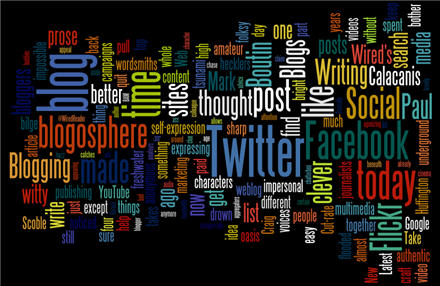Paul Boutin doesn't get social media I read
this lame article on Wired by Paul Boutin earlier today and promised myself I wouldn't take the bait and blog about it. But when a certain mustached colleague of mine pinged the link around the office, I couldn't help myself.
Thanks a lot, Craig. ;-)
Wired's Paul Boutin has written an incredibly uninformed post about blogging. Here's the main premise:
Writing a weblog today isn't the bright idea it was four years ago. The blogosphere, once a freshwater oasis of folksy self-expression and clever thought, has been flooded by a tsunami of paid bilge. Cut-rate journalists and underground marketing campaigns now drown out the authentic voices of amateur wordsmiths. It's almost impossible to get noticed, except by hecklers. And why bother? The time it takes to craft sharp, witty blog prose is better spent expressing yourself on Flickr, Facebook, or Twitter.
The fact is, there are different forms of social media, and they do different things. To suggest that one will replace the other is as naïve as suggesting that we will all stop going to the cinema because we can watch movies on our TVs or PCs or phones.
Twitter provides people with a quick way of communicating status and ideas … in under 140 characters.
Flickr is great for photos (and short videos) and allows like-minded people to share stuff.
Facebook is fab for networking and wasting time at work and school.
Blogs provide room for more developed thought and discussion.
Then there’s all the cool stuff that Paul forgets to mention: Video platforms (like
YouTube and
Vimeo), vertical social networks for music (like
LastFM, Pandora), travel networks (Gusto, TripAdvidor) and so on.
The point is they each do different things, and judging by how many people use them (as opposed to the portal dinosaurs of yesteryear), it looks like people like it that way.
Whilst independant, thanks to RSS, XML, AJAX and other fun technology, they all fit together. iGoogle, Netvibes and other second-generation portals do a pretty good job of pulling it into one place. New services like
FriendFeed do it in a very simple way that allows for it all to be aggregated and redistributed in a variety of ways.
Of course, we’re still just scratching the surface …
Location-based content generation and the resulting mobile-enabled social networks will add an incredible new dimension to this whole thing, as will simple things like better filtering so we don't get overwhelmed by it all.
Paul Boutin closes his piece with this idiotic gem:
As a writer, though, I'm onto the system's real appeal: brevity. Bloggers today are expected to write clever, insightful, witty prose to compete with Huffington and The New York Times. Twitter's character limit puts everyone back on equal footing. It lets amateurs quit agonizing over their writing and cut to the chase. @WiredReader: Kill yr blog. 2004 over. Google won't find you. Too much cruft from HuffPo, NYT. Commenters are tards. C u on Facebook?
The only way he can level the playing field is by limiting everyone to 140 characters? So much for considered debate and thought. So much for thinking. So much for good writing skills. Let's all just text each other for now on, ok? Because, according to Paul (
and others like Maurice Saatchi), continuous partial attention is forcing thought to be reduced to the lowest common denominator.
If Paul Boutin had it his way, we'd become a planet that communicates with emoticons.
Isn't that pathetic!?! >:(
The irony, as Wild Bill pointed out, is that the story is posted on Wired's blog. What's even more ridiculous is that Paul Boutin is a blogger. He writes for the popular Silicon Valley gossip blog,
Valleywag. Essentially, this is a gossip blogger writing about how bad blogging is because there is so much gossip and crap on blogs.
This one is for you, Craig: BAM!
Personally, I think the whole thing is designed for “linkbaiting”, and Vallywag is very very good at this. For the uninitiated, here's how it works: The "journalist" writes something so inflammatory and ludicrous that it catches the attention of the blogosphere, who like moths drawn to a flame cannot help themselves other than to blog and discuss it, thus increasing the links and traffic to the author's site.
Why else would
Paul Boutin write something so obviously ill thought out and categorically unadvised? Surely, Wired wouldn't employ a journalist/blogger who knows nothing about social media, right?
And yes, that makes me a moth.






 Comments:
Comments:




